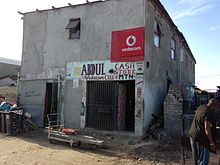Spaza shop

‘Spaza’ is a generic isiZulu colloquial term, meaning ‘hidden’or 'camouflaged'. [1][2] Spaza shops, also known as tuck shops originated in Apartheid-era South Africa when enterprising Historically Disadvantaged Individuals were restricted from owning formal businesses, they began setting up informal, micro-convenience shops from their homes to serve their communities' daily needs in the townships.[3][4]
Since 1994, these shops have continued to transform and develop in popularity and necessity along with the sprawling townships where people live long distances from the more expensive, formal shopping areas.[3][4][5] Initially selling daily essentials like Mielie meal, bread, and sugar over time, they've expanded their offerings to include a variety of goods, from small furniture items to toiletries, and even some electronics.
With the fall of apartheid came an inflow of migrants from across the continent, seeing many undocumented Ethiopian and Somali asylum-seekers coming to South Africa and opening spaza shops, creating tension between local and foreign micro-entrepreneurs.[6][4][5][7] South Africa received 778,000 asylum applications between 2008 and 2012 alone and now more than 60% of spaza shops in townships today are run by foreign nationals.[5] This tense situation between shopkeepers and local residents is helping to drive a culture of xenophobia and social conflict.[3][4][5][7]
South African banks are trying to win spaza shops as "bank shops" offering minimal banking services at lower costs than full bank branch offices. The link to the bank's back office is mostly via mobile phone based mobile banking.[8]
References
[edit]- ^ Bear, M, P Bradnum, S Tladi and D Pedro (2005) Making Retail Markets Work forthe Poor – why and how triple trust organisation decided to intervene in the Spazamarket in South Africa. Washington, D.C.: The SEEP Network.
- ^ Terblanché, N.S. (1991). "The spaza shop: South Africa’s first own black retailing institution", International Journal of Retail & Distribution Management, Vol. 19 Iss 5 pp.
- ^ a b c Lamb et al (2019) Lessons from Foreign Owned Spaza Shops in South African Townships. Journal of Reviews on Global Economics. 8, 1351-1362. Retrieved 12 August 2024.
- ^ a b c d Kgaphola, Tawodzera, & Tengeh (2020) An Assessment of the Structure and Operation of Spaza Shops in a selected township in South Africa
- ^ a b c d Charman et al (2012). From local survivalism to foreign entrepreneurship: the transformation of the spaza sector in Delft, Cape Town. Transformation: Critical Perspectives on Southern Africa. 78. 47-73. Retrieved 12 August 2024.
- ^ Anyadike(2023) From Ethiopia to South Africa: The human cost of a neglected migration route.The New humanitarian
- ^ a b "African migration: To the land of good hope: African migrants head south as well as north". The Economist. 2016. Retrieved 13 August 2024.
- ^ "Standard sees big target at the lower end". MobileMoneyAfrica. 23 April 2011. Retrieved 2 May 2012.
External links
[edit]
